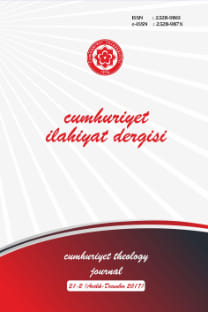Edebiyatımızda Çok Bilinmeyen Bir Tür: Rûznâme ve Bir Rûznâme Örneği
Türkçede günlük anlamına gelen rûznâme, tarih araştırmalarında Osmanlı padişahlarının sır kâtipleri tarafından kaleme alınan günlükleri ifade eder. Tarihi vesika niteliğindeki rûznâmelerin dışında edebî bir tür olarak da bu tür eserlere rastlanır. Haftanın veya ayın her bir gününde yapılması iyi veya iyi olmayan davranışlar bu eserlerde anlatılan konulardandır. Makalemiz, ayın her bir gününde yapılması ve yapılmaması gereken şeyleri ele alan “Kitâb-ı Rûznâme” isimli el yazması bir eseri ihtiva etmektedir.
A Literary Genre Unknown Sufficiently in the Turkish Literature: Rūznāme and An Example
ABSTRACT: The word of rūznāme means diary in the Persian language. In the historical records it refers to special diaries written by the secret clerks of Ottoman sultans. Apart from that there are various different types of rūznāmes. In some rūznāmes were described repetitious behaviors that they are a suitable or an unsuitable for each day of the week or month. This article aims to investigate a manuscript named “The Book of Rūznāme” contains suitable and unsuitable behaviors for each day of month.SUMMARY: The word of ‘rūznāme’ which is formed of rūz, meaning day and nāme, meaning letter, booklet and book in Persian; is a very rich and comprehensive word, meaning a kind of notebook in which incomes and outcomes, adventural events written in and diary, daily newspaper, calender and actuality. When it comes to its usage, we face two scientific fields as history and literature. The documents, written by Ottoman sultans’ sacred writers about his activities during the day, are important for historical sciences; the documents which contain some guesses about whether a planned activity in days of any one of 12 months is good or not, are important for literal sciences in meaning. In literal rūznāme, because the main purpose is bringing news about future, these texts can be seen as fortune books. In Turkısh literatüre, the texts written on this subjects are very few. So, every text in the kind of rūznāme is very important in literal area. This text, which our article is about, is a little poem, formed 58 verses written in the system of masnawi. After the verses in which gratefulness for Allah and salavat for His Prophet were said, the main subject came in the text. After this entrance, composed of six verses, the characteristics of days from the first of them to thirtiest one were said and some recommadations/warnings about doing something on these days were given under the title of ‘ Bāb…Gün’. In the text, the characteristics of days were explained in two verses generally. Besides, it is seen that some days were explained in one verse, another day was explained in three verses and another day was expalined in four verses. It is expressed that from 30 days ordered regularly, 18 of them are auspicious, 8 of them are inauspicious, 4 of them are auspicious for some works and inauspicious for some others. For example it was said that getting married, shopping, travelling are good on the 14th day of the month and it is necessary to plant a tree and to demand for something. But it was expressed that a baby boy, borned in the 16th day of the .onth would be unhealthy, it is necessary to give blood for health and to avoid doing any work in this day. In this article some information is given about ruzname which is a fortune-based literal text and a sample of ruzname in the text between the pages of 8a-10a in the magazine, registered with the number of 213 in Suleymaniye Library, Halet Efendi Part, has been offered to scientific area.
Keywords:
Turkish Literature, Masnavīs, Malhama Rūznāma,
___
Boyraz, Şeref. Türk Halk Biliminin Yazılı Kaynakları Olarak Melhemeler. Doktora tezi, HÜSBE, Ankara 2000.Boyraz, Şeref. “Üç Manzume ve Halkbilimi Açısından Değeri”. Türklük Bilimi Araştırmaları 9: 151-174.
Çelebi, İlyas. “Fiten ve Melâhim”, DİA, İstanbul 1996, 13: 151.
Çelebioğlu, Amil. “Yazıcı Sâlih ve Şemsiyye’si”. Atatürk Üniversitesi İslami İlimler Fakültesi Dergisi 1: 171-218.
Dizer, Muammer. “Ebû Ma’şer el-Belhî”. DİA. İstanbul 1994, 10: 182-184.
Sarıcaoğlu, Fikret. “Rûznâme”. DİA. İstanbul 2008, 5: 278.
Sümbüllü, Yusuf Ziya. “Halk Meterolojisi Ekseninde Bir Melheme Örneği”. Turkish Studies İnternational Periodical For The Languages, Literatüre and History o f Turkish or Turkic, Türkiye Dışındaki Türkler Dosyası 3, sy. 7 (Fall 2008): 787-788.
Uzun, Efkan. “Sultan Mahmud’a Ait Bir Rûznâme (H. 1147-M. 1734)”. Turkisk Studies- International Periodical For The Languages, Literatüre and History o f Turkish or Turkic 8, sy.7 (Summer 2013): 687-703.
- ISSN: 2528-9861
- Yayın Aralığı: Yılda 2 Sayı
- Başlangıç: 1996
- Yayıncı: Cumhuriyet Üniversitesi İlahiyat Fakültesi
Sayıdaki Diğer Makaleler
Engelli Çocuğa Sahip Annelerde Yas Süreci
İlk Dönem Eş'arî Kelâmında Müteşâbih Âyetlerin Te'vili Sorunu
YENİ AD, YENİ SAYI, YENİ WEB SAYFASI VE ZENGİN İÇERİK
Edebiyatımızda Çok Bilinmeyen Bir Tür: Rûznâme ve Bir Rûznâme Örneği
Mâtürîdî Âlimi Ebû İshâk Zâhid es-Saffâr'ın Kelâm Müdâfaası
Mehmed Fazlullah es-Sivâsî’nin el-İtidâl fî Muhabbeti’l-Âl Adlı Mesnevîsi
Tasavvufun ve Epistemolojik Bir Araç Olarak İlhamın İbn Teymiyye Düşüncesindeki Yeri
Karl R. Popper'ın Tarihsicilik Eleştirisi
Hz. Peygamber'in Hadîslerinde Geçen -Biz- Vurgusu Bağlamında Toplumdaki Birleştiriciliği
